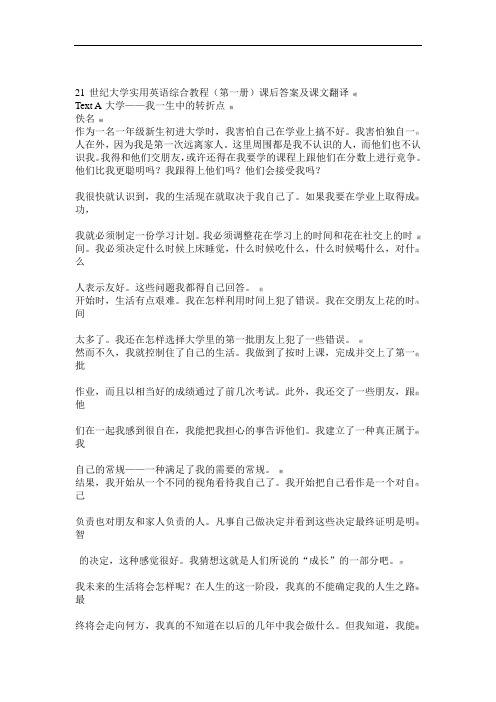Unit 1Text AMany people often turn a blind eye to the "ordinary" things in life. They are not aware of the existence and importance of the sun, water and air. In this text, the writer tells us how important the sun is to all living things on the earth and what would happen if the sun did not reappear the next morning.Great Baee of FireHugh DownsIn an interview following my 1965 voyage across the Pacific in a small sailboat, I was asked what power I had on that boat. "Atomic power," I told the reporter.I wasn't kidding: The boat did have an auxiliary engine and a limited fuel supply; but its main power was its sails. The sails, of course, did nothing unless there was wind, but the wind would not blow if there were not a temperature difference that made cooler air move into the space vacated by the rising warm air.And there would be no warmer air unless something heated it.That something is an atomic furnace 93,000,000 miles away that pours its radiation constantly on the day side of the turning Earth. It heats the air, makes it rise, sucks in other air, makes it blow on the sails and causes the boat to be pushed. So every sailboat is powered by an atomic engine—the sun.You Gotta Love ItAlthough the sun is very large compared to the Earth, it is one of myriad stars in a very large galaxy, which is one of myriad galaxies in a very large universe. But the sun is special to us because it is the closest star; it holds us in its gravitational grip. And its energy, raining down on the home planet, is utterly necessary for the maintenance of all life.I've often thought that among the things humans have elected to worship over historic and prehistoric eras, the sun is the most appropriate visible object. Sun worshippers were not too far off the mark.For life to continue here, the sun must keep on shining. Scientists say that if it died (unlikely in the extreme—it's good for another 5 billion years), in less than two weeks nothing would move on the Earth's surface. Nothing would remain alive.This is easily seen when you think about how it gets cooler after the sun goes down, and is coolestjust before it comes up the next morning. If it's 80 degrees Fahrenheit at sunset and goes down to 60 just before dawn, the only reason the temperature goes back up is that the sun reappears and starts warming things up again.When Hell Freezes OverSuppose it didn't do that.In two days the temperature would go to 40, and then 20 (all water would start to turn into ice) and the next day zero, and then 20 below and 40 below, and so on.In about 10 more days, when the temperature was close to absolute zero, the gases of the atmosphere (nitrogen and oxygen) would freeze, putting a light snow of solid nitrogen onto the ground, followed by a fine powder of oxygen.The Earth would then have no liquid water, no atmosphere, and no life.Perhaps these facts refute the foolish sage who once said the moon was more important than the sun, because the moon shines at night, when we need the light, while the sun shines in the daytime when we don't need it!(509 words)Unit 2Text AIn the following text, the writer tells us how we can manage to face each day happily. She suggests that we should have a correct attitude towards ourselves, others and the world. By following her suggestions we can probably find that our lives are indeed quite happy and colorful. It's a New Day!Marie T. RussellEvery day is a new day. That is an indisputable fact. Every day when we awake, it is a different day than the one before. Another brand-new 24-hour day to explore and experience! By accepting each new day with a fresh, enthusiastic attitude, you can make your life more joyful. What could be blocking your realization of a new day? It stems from your ideas about yourself, others and the world around you.Let's start with you. Do you see life as one unending saga, each day like the one before? You know, "Same day, same old stuff?" Do you have beliefs about yourself such as, "Oh, I can't sing. I'm tone-deaf," or "I can't draw. I'm no artist," or "I'm so clumsy. I have two left thumbs. I'm so stupid!" These words reflect inward beliefs that lock us into a frame of mind and a particular behavior pattern. All of these statements demonstrate a belief you have chosen and accepted about yourself. They are also beliefs that serve to close doors to any new experiences or new days.Let's look at relationships. When I use the term relationships I refer not only to intimate ones, but to everyone in your life... co-workers, family, people you see in the store, the other drivers in traffic... everybody! Many of us classify people as, "friendly", "intelligent", "stupid", "clumsy",etc. We form opinions about them, "Oh! him! He's so lazy," or "Jack is such a good artist—too bad his daughter just can't draw."Take a look at how most children are raised. At some point in the child's existence, someone decides (or rather makes a judgment) that little Sarah can't sing, is clumsy, laughs too loud, or is intelligent, or whatever. No matter what the judgment is, these statements get repeated in front of friends, family, strangers and, unfortunately, little Sarah. She then accepts this as her reality... after all it is coming from the mouth of a "godly" parent or adult.All of these statements and opinions support someone's view of reality. When you make it your own it locks you into a mode where you have certain fixed expectations. They do not allow room for change; and since life is all about change, these beliefs leave no room for miracles.How does one live each day anew? First, one must release all pre-conceptions and beliefs about everyone and everything. Begin by looking at yourself and the people in your immediate surroundings. When dealing with yourself, there are two things you can change—your beliefs and your behavior. If you believe that you are always late (and want to change that), then stop saying that you are always late. When you tell yourself "I'm always late," the body and mind take that as an instruction. In the same fashion, if you start affirming "I'm always on time," that is taken as a directive and your subconscious and conscious mind will work at creating your new reality.So if you want to be a better person, start by changing your beliefs and your expectations. Then change your actions. Behave more lovingly. Expect the best! Visualize yourself and the world as a loving, peaceful, harmonious place. It's all possible! After all, it is a new day. Treat yourself to a new perspective every day. Start to expect miracles and they will happen!(562 words)Unit 3Text AHave you ever paid tributes to your mother? Have you ever expressed your emotions on the theme of mothers? Here industrialist Ross Perot and Professor Michael DeBakey are eager to salute their own mothers.MothersAn old Jewish proverb says, "God could not be everywhere, and therefore he made mothers." Ann Taylor expressed her emotions on the theme of mothers with the following:Who ran to help me when I fell,And would some pretty story tell,Or kiss the place to make it well?My mother.On account of the many tributes paid to mothers from the time of Eve, one might think the subject exhausted. But not so. Here, Industrialist Ross Perot and Professor Michael E. DeBakey are ready, indeed eager, to salute their own cherished mothers.My mother was an angel.Our family lived six blocks from the railroad tracks. During the Depression, the freight trains were filled with hoboes wandering from town to town looking for work. Every day they would come by our house asking for food. My kind mother would always share our food with them.These people were poor and desperate, but we had absolutely no fear of them. When they knocked and asked for food, there was no concern that they might break in and steal things.One day, a hobo said, "Lady, don't you have a lot of people stopping by here?"My mother said, "Yes, we do.""Do you know why?" he asked.She replied, "Not really."Then he took her out to the street and showed her a mark on our curb. He said, "Lady, this mark on your curb says that you will feed people. That's why you get so many visitors."After the man left, I turned to my mother and said, "Do you want me to wash that mark off the curb?"She replied with words that I will remember for the rest of my life. "No, Son, leave it there. These are good people. They are just like us, but they're down on their luck. We should help them." Ross PerotIndustrialistMy mother's birthday, Christmas, is symbolic of her human warmth, her giving nature, her noble character, and her high Christian values. She and my father instilled those values in all their children from the earliest age, and she lived to make life better not only for her family, but for everyone she knew, particularly those less fortunate than she.I recall vividly one incident in my childhood that had a lasting impact on me. Every Sunday after dinner, my parents would pack food, clothing, and books in our car and would drive, with their children, to an orphanage just outside our hometown. One Sunday I saw my mother packing a favorite cap of mine, and I protested. She calmly explained that I had several other caps and could easily get new ones, whereas the orphan who would receive this cap had none at all. She assured me that I would derive a special feeling of happiness when I saw the smile on the boy's face as he put the cap on his head. That lesson made a deep impression on me, and the truth of her words has certainly stood the test of time as other incidents in my life have validated her words. I consider the wonderful parents that God gave me my greatest blessing, for they both believed it was always more blessed to give than to receive.Michael E. DeBakey, M.D.Professor(545 words)Unit 4Text AOne day, a man who seemed to own everything he could want suddenly felt a deep, inexplicable sadness. What's wrong with him? Did he finally regain his happiness? Here is the story...The Happiest Man in the WorldAdapted by Amy FriedmanOnce upon a time there lived a man named Henry who had both land and money. He loved his wife and their strong and healthy children. In short, Henry had everything a man could want. At least that's the way it seemed to everyone who knew him.But one morning Henry awoke from a deep sleep beneath a warm comforter, his eyes filled with tears. His heart felt heavy. "I'm unhappy," he said. For a moment he was frightened by such a feeling, but then he jumped out of bed, packed a picnic lunch and set off for a walk in the woods. He was determined to feel happy again.Henry hiked for hours, looking at the bright blue sky, enjoying the crisp autumn day. Everyone he passed greeted him. His neighbor's dog barked hello. Another neighbor, meeting him as he returned home, handed him a freshly baked pumpkin pie, which he took home for supper.Henry had always loved pumpkin pie, but even the pie, and his children's happy voices and the blaze of the fire in the hearth, did not lift his spirits. He fell asleep feeling unhappier than he had ever before felt in all his life.When he woke the next morning, he was even sadder. "I must fix this," he said, and set off for the city, where he thought he would find a hundred ways to cheer himself. He purchased silver bracelets for his wife and bags of candy for his children. He bought himself a pair of the softest slippers he could find. He dined in an elegant restaurant, and ate his favorite foods. And still that night he felt a deep sadness.Weeks passed in this way. The ripe pumpkins in the field that had once brought him joy did nothing to raise his spirits. Neither did the moonlit nights, the honking geese, the flowing streams, the fields of hay, the chatter of the children, the feel of his soft new slippers. Henry sipped hot chocolate. He ate ripe apples. He bathed in warm baths and listened to beautiful music. But nothing helped.At last, at his wit's end, Henry went to see a wise man, and there he begged with a voice filled with misery and longing. "Sir, please tell me what I can do to find a way to lift my heavy heart. I must be cured of this terrible illness, which seems to have come from nowhere. I must find happiness.""That which is clear to some people is sometimes hidden from others," the wise man said. "You must find the happiest man in the world. When you find him, ask him to trade his shirt for yours. Happiness will be yours once again."Henry set off at once to find the happiest man in the world. One after another he came upon men who told him they were happy. Then Henry asked them one question: "Would you be happier if I gave you all my money?""Yes," each man answered."Then you are not the happiest man in the world," Henry said, and he went on searching.One day as he walked through the forest, he heard someone in the distance singing the happiest song he had ever heard. He followed the sound and soon came to a woodcutter chopping logs. "Excuse me. My name is Henry, and I am looking for the happiest man in the world," he said. "You've come to the right man," the woodcutter said. "I'm happy as can be.""Ah, then," Henry said, "would you like me to give you all my money?"The woodcutter laughed. "I have no need for your money. Look at all I have," and he beckoned Henry to look at the forest—at the red and golden leaves, at the squirrels scurrying across the forest floor, at the birds perched overhead, at the deer grazing nearby."At last!" Henry cried. "I have been searching for you for a long time now. The wise man told me that if I exchanged shirts with the happiest man in the world, I would be cured of my illness. You see, I'm unhappy. Please, will you exchange your shirt for mine?"The happiest man in the world looked closely at Henry, and then he began to laugh and laugh. He laughed until the forest echoed with his laughter.When at last he quieted himself, Henry asked him, "How can you laugh at such a serious request? You see my shirt. It's made of the finest cotton, and it will be yours. All I need is to wear yours." And then the woodcutter unbuttoned his tattered coat, and Henry saw that the happiest man in the world wasn't wearing a shirt."I own no shirts," the woodcutter said. "But now you know that you have the strength to seek all that you think you should have."Henry smiled, for now he understood why the wise man had sent him on this journey. He felt his heart became light once more.(841 words)Unit 4Text AOne day, a man who seemed to own everything he could want suddenly felt a deep, inexplicable sadness. What's wrong with him? Did he finally regain his happiness? Here is the story...The Happiest Man in the WorldAdapted by Amy FriedmanOnce upon a time there lived a man named Henry who had both land and money. He loved his wife and their strong and healthy children. In short, Henry had everything a man could want. At least that's the way it seemed to everyone who knew him.But one morning Henry awoke from a deep sleep beneath a warm comforter, his eyes filled with tears. His heart felt heavy. "I'm unhappy," he said. For a moment he was frightened by such afeeling, but then he jumped out of bed, packed a picnic lunch and set off for a walk in the woods. He was determined to feel happy again.Henry hiked for hours, looking at the bright blue sky, enjoying the crisp autumn day. Everyone he passed greeted him. His neighbor's dog barked hello. Another neighbor, meeting him as he returned home, handed him a freshly baked pumpkin pie, which he took home for supper.Henry had always loved pumpkin pie, but even the pie, and his children's happy voices and the blaze of the fire in the hearth, did not lift his spirits. He fell asleep feeling unhappier than he had ever before felt in all his life.When he woke the next morning, he was even sadder. "I must fix this," he said, and set off for the city, where he thought he would find a hundred ways to cheer himself. He purchased silver bracelets for his wife and bags of candy for his children. He bought himself a pair of the softest slippers he could find. He dined in an elegant restaurant, and ate his favorite foods. And still that night he felt a deep sadness.Weeks passed in this way. The ripe pumpkins in the field that had once brought him joy did nothing to raise his spirits. Neither did the moonlit nights, the honking geese, the flowing streams, the fields of hay, the chatter of the children, the feel of his soft new slippers. Henry sipped hot chocolate. He ate ripe apples. He bathed in warm baths and listened to beautiful music. But nothing helped.At last, at his wit's end, Henry went to see a wise man, and there he begged with a voice filled with misery and longing. "Sir, please tell me what I can do to find a way to lift my heavy heart. I must be cured of this terrible illness, which seems to have come from nowhere. I must find happiness.""That which is clear to some people is sometimes hidden from others," the wise man said. "You must find the happiest man in the world. When you find him, ask him to trade his shirt for yours. Happiness will be yours once again."Henry set off at once to find the happiest man in the world. One after another he came upon men who told him they were happy. Then Henry asked them one question: "Would you be happier if I gave you all my money?""Yes," each man answered."Then you are not the happiest man in the world," Henry said, and he went on searching.One day as he walked through the forest, he heard someone in the distance singing the happiest song he had ever heard. He followed the sound and soon came to a woodcutter chopping logs. "Excuse me. My name is Henry, and I am looking for the happiest man in the world," he said. "You've come to the right man," the woodcutter said. "I'm happy as can be.""Ah, then," Henry said, "would you like me to give you all my money?"The woodcutter laughed. "I have no need for your money. Look at all I have," and he beckoned Henry to look at the forest—at the red and golden leaves, at the squirrels scurrying across theforest floor, at the birds perched overhead, at the deer grazing nearby."At last!" Henry cried. "I have been searching for you for a long time now. The wise man told me that if I exchanged shirts with the happiest man in the world, I would be cured of my illness. You see, I'm unhappy. Please, will you exchange your shirt for mine?"The happiest man in the world looked closely at Henry, and then he began to laugh and laugh. He laughed until the forest echoed with his laughter.When at last he quieted himself, Henry asked him, "How can you laugh at such a serious request? You see my shirt. It's made of the finest cotton, and it will be yours. All I need is to wear yours." And then the woodcutter unbuttoned his tattered coat, and Henry saw that the happiest man in the world wasn't wearing a shirt."I own no shirts," the woodcutter said. "But now you know that you have the strength to seek all that you think you should have."Henry smiled, for now he understood why the wise man had sent him on this journey. He felt his heart became light once more.(841 words)Unit 5Text AErnest Shackleton made many great achievements in his life as an explorer. The following story does not tell us, however, what he achieved but how he managed to rescue his men after his failure to reach his goal.Perhaps being a hero does not necessarily lie in what you do but in how you do it. Shipwrecked in AntarcticaWhen Ernest Shackleton packed for his trip to Antarctica in July 1914, he seemed ready for anything. Among the items he and his crew stowed in his ship were cans of meat, a bicycle and soccer balls. Shackleton hoped to become the first person to travel across the frozen continent at the bottom of the world.But nothing could have prepared Shackleton or his crew for what did happen. Instead of crossing Antarctica, they made history in one of the most incredible survival stories ever.Stuck in Miles of IceShackleton was already famous when he prepared for the 1914 trip. In 1908 he had come within 100 miles of the South Pole but had turned back because of bad weather.By 1914, he was eager for another adventure. Nearly 5,000 people volunteered to go with him. Shackleton chose a crew of 26 sailors and scientists, plus a photographer, Frank Hurley. On the way to Antarctica, he picked up at least 69 sled dogs to pull the explorers on the long trek across land.Shackleton's last stop before heading for Antarctica was a whaling station on South Georgia Island. Norwegian whalers told the crew that it was "a bad year for ice."They were right. Upon entering the Weddell Sea, Shackleton was forced to zigzag through dangerous ice sheets, sometimes passing more than 400 icebergs a day! On January 18, 1915, the ice closed around the ship. It was stuck, as one sailor put it, "like an almond in the middle of a chocolate bar."Although he was less than 100 miles from Antarctica, Shackleton soon realized he could not possibly cross the continent that winter. The crew would just have to wait.Fighting Boredom and ColdAs the ship slowly drifted with the ice, the sailors played cards, listened to records and held singing contests. "This was before TV," says Armstrong. "People were used to entertaining themselves." On the snow outside, the men built fancy "doghouses" with porches and domes. Some even slept with the dogs for warmth.Meanwhile Frank Hurley kept busy taking photos. Often braving the cold while others stayed indoors, "he would do anything to get his shot," says Armstrong.The ship was locked in ice for 10 months. By October 1915, the ice was crushing its thick wooden walls. "It was a sickening sensation," Shackleton wrote in his diary. He ordered the crew to leave. They grabbed what they could, including 150 of Hurley's precious photos.A Heroic RescueThe sailors struggled to reach land on three lifeboats they dragged across ice and rowed through frigid waters. They shivered in their thin coats, which often froze solid. At times they had to crawl through slush to avoid sinking. While killer whales swam around them, Shackleton and his men ate penguin and burned seal blubber for fuel. Sadly, when they ran out of food for the dogs, the crew had to shoot them.Eventually, the crew landed on Elephant Island. But it was deserted. So Shackleton bravely set out again with five of his strongest men. They sailed and rowed 800 miles in a tiny boat, battling high waves, winds and severe thirst. Finally they landed at South Georgia Island, where they almost died climbing jagged peaks for three days before reaching the whaling station. "The thought of those fellows on Elephant Island kept us going," said Shackleton.Four months after Shackleton sailed away, one of the men on Elephant Island spotted a ship offshore. When it came closer, the crew recognized Shackleton. They began to laugh and hug. They were rescued!To the world's amazement, all 28 members of the expedition arrived home safely. How? Armstrong and others say it is because Shackleton was a true hero. As the explorer said, "If you're a leader, you've got to keep going."(638 words)Unit 6Text AOne summer holiday, a teenager volunteered to work in a soup kitchen and got her first big lesson there. What was the lesson she drew from the experience? Let's read the following story. Becoming a Better PersonLaura HennesseyIn the summer of 1992 I got my first big lesson in community service. I can still remember how I felt the first day of my volunteer assignment. I thought I was one of the most selfless teenagers around, giving a whole month of my precious summer to work in a soup kitchen.At 7 a.m. every morning, I would walk to the bus stop in my suburban neighborhood, board the 67A and settle in for the hour-long ride into, what seemed to be, another world. Goodbyeair-conditioning, big grassy yards and pedigree dogs. Hello smelly soup kitchen, sweltering street corners and trash-filled alleyways. I felt like a saint.Two experiences from that month in the soup kitchen still stand out in my mind. One day the kitchen got a huge cardboard box filled with unpeeled baby shrimp. Needless to say, I, with the help of other volunteers, spent the whole morning sorting through and peeling a million little shrimp for the gumbo. I couldn't eat shrimp for years.The second experience was far more influential than the shrimp incident, but it was also much more difficult. Part of our job at the soup kitchen was to come up with activities for the neighborhood kids. We would see the same kids almost every day, so we got to know them quite well. I became particularly fond of a young boy named Bruce.One rainy day Bruce, who was normally very outgoing and laughed easily, sat motionless, all alone at a big table in the corner. We tried to get him to join in the fun with the other kids, but he refused to take part in the silly games. Eventually, I approached him and sat down to talk. "Hi, Bruce. How are you?" No response. "What's wrong, Bruce? Are you sad?""No.""Are you angry at somebody?""No.""OK, Bruce. Are you tired?""No.""Are you sick?"Once again Bruce replied, "No."I was beginning to get a little frustrated and starting to realize that maybe Bruce just wanted to be left alone. But then, he finally filled me in. He said, in his meek voice, "I'm hungry; my mom forgot to feed me."I smiled as my heart simultaneously broke. "Well then, Bruce. Let's find you some food." Then,hand in hand, we went into the kitchen and found the only food that was around that time of day — a couple of doughnuts. Bruce eagerly ate the tasty sweets, and I felt like a hero.When I got off the bus that day I hurried home to fill my mom in on my day. I relayed the story to her in a tone tinged with excitement. Then, slowly, I saw a look of concern and worry spread across my mother's face. She then sat down with me and said, "Laura, that's great that you were there for him today, but you have to realize that it is only one day. What's going to happen tomorrow, or next week or a month from now, when you are no longer there? You really have very little control over this little boy's diet, let alone his life."Her words struck me hard, but in that instant I realized a great many things about what it means to "make a difference." For a brief moment I felt useless, and I wanted to give up my dreams of changing the world for the better. But that moment quickly passed when I realized that giving up my dreams would mean giving up a very important part of myself. Quitting was not an option.It was then that I knew service was going to be a part of my life for the rest of my life. It's not about becoming a saint or a hero. It is about becoming a better person.(642 words)Unit 7Text A"Why do I have to learn math? I'll never use this again in my whole life." This kind of complaining can often be heard among students. Is it true that nobody needs math? Well, the author is going to tell you the story...Math, Who Needs It?Carlie Vanwilligen"That'll be $6.52," the cashier said. I handed her a $10 bill. She looked at it, then looked at me. As I waited, she started writing on a pad of paper. After what seemed like several minutes, she handed me the change. "$4.52 is your change," she smiled.I stared at the change, then at her. "That's not right," I said. She looked at me, confused. "I gave you a $10, the change would be $3.48." I handed the money back to her."I'm sorry," she replied. "Our computer is down, and I have to do this by hand. I'm not very good at math." She counted out my change, and I left.As I think back on this exchange, I feel sad, sad because it wasn't the first time it had happened, sad because I know it won't be the last. I taught high school math for years, and every year, the conversation was the same: "Why do I have to learn this? This isn't important. I'll never use this again in my whole life."Unfortunately, students don't see the eventual impact of studying a subject. And when that subject is math, they see the value even less. I no longer teach full-time, but I look back on those。
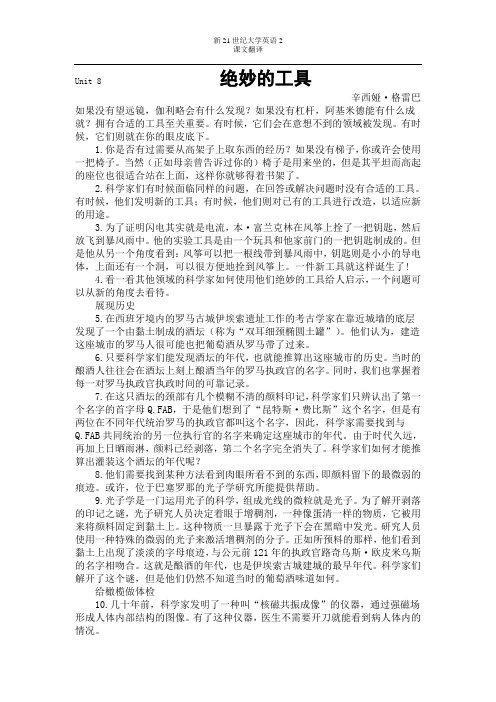


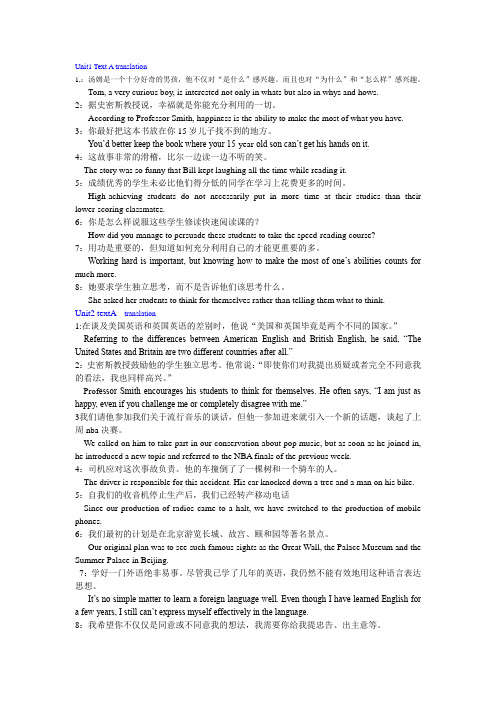
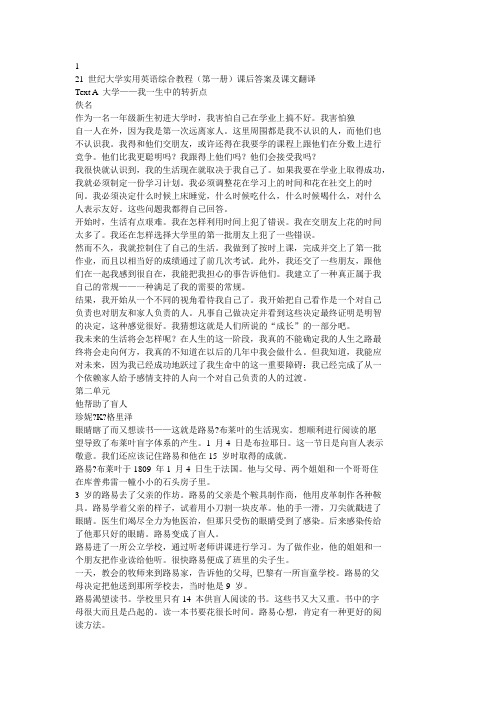




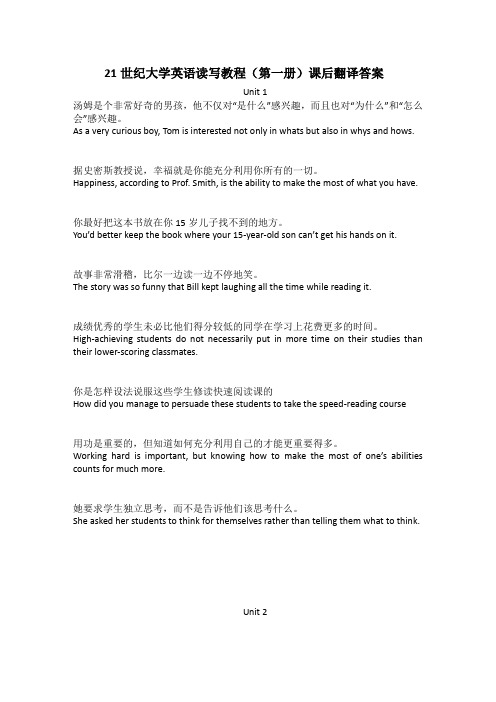
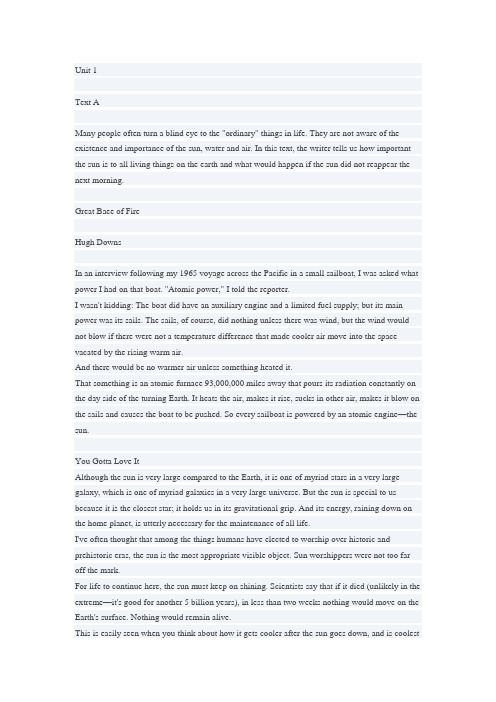


![21世纪大学实用英语-book1-课文翻译[1]](https://img.taocdn.com/s1/m/1f7badf5941ea76e58fa048a.png)


